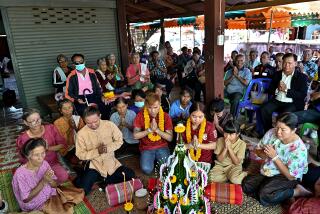American Family Works to Save Primitive Jungle Tribe from Extinction : Missionaries: Lessons in survival come before religious conversion for an isolated people of Thailand and Laos.
- Share via
BAN BOONYUEN, Thailand — The Spirits of the Yellow Leaves, who are some of the world’s most primitive and timid tribal people, have found protection from an unlikely source: an American missionary family.
Eugene Long, his wife, Mary, and their three children have lived among the Mlabri for nine years. Although the goal is to convert them to Christianity, the Longs have yet to bring up God or the Bible. Their more immediate task is to ensure the tiny tribe’s survival and bridge the vast gap between these hunter-gatherers and the modern world.
There are fewer than 200 Mlabri in Thailand. Some others are believed to be living deep in the forests of neighboring Laos. The Thai population has diminished over the last decade, and Long said that further shrinkage would probably mean extinction for the tribe.
Not long ago, all Yellow Leaves roamed the jungle in small family groups. They ate wild fruits, roots and meat from any animal they could snare or spear. In Laos, they may still live this way.
There were many myths about these elusive people, who were said to move each time the leaves of their flimsy shelters turned yellow. They wore little more than loin cloths and used crude implements of a prehistoric age. Their language, which has no written form, identifies just three colors--green, red and blue. It does not distinguish between a month and a year, and has words for counting only “one,” “two” and “many.”
The first outsider to meet and study the Yellow Leaves was Austrian anthropologist Hugo Bernatzik, in 1937. Danish scholar Jesper Trier described them as one of the most primitive peoples, descendants of Australoid tribesmen overwhelmed by the great Mongoloid migrations into Southeast Asia.
When Long first encountered the Yellow Leaves, he had images of cannibals feasting on missionaries. Some of them later confided that they thought he had come to eat them.
Long’s trail to the tribe had been circuitous. At 14, he was a self-described “hood” with a police record. The turning point came after he nearly died from alcohol abuse.
After graduation from high school near Orlando, Fla., he joined the New Tribes Mission, which works with remote, little-known peoples around the world. At the missionary school he met Mary. They married and were sent abroad.
The family moved to the hills of Phrae Province in northern Thailand. Their rough, frame house is in a lovely valley, three miles from the nearest village.
The house has no refrigerator or window panes, and no television to distract Allen, 14, Jared, 11, or 7-year-old Crystal from their studies, which they carry out by correspondence. Staying well is a problem. Long has suffered two bouts with malaria.
Initially, the Mlabri (which means “People of the Jungle”) came and went. Their faces would be expressionless. The women and children would run away when Long approached. They lied or refused to talk about themselves and their culture, even after the Longs learned to speak their language.
“The lives of the Yellow Leaves are ruled by fear--fear of human enemies, tigers, disease, the spirits of their animist world,” Long said. “They themselves are passive. Resolution of conflict is flight.”
The rapid disappearance of Thailand’s great forests has shut off their escape and most of their traditional livelihood. Waiting for them as they came out of the jungles were the Hmong, a large, more aggressive and technologically sophisticated tribe.
Long said that the Hmong treat the Yellow Leaves like slaves. They lure them with pigs--pork is their favorite food--and then force them to work off their “pork debt” under appalling conditions and for abysmally low wages.
Now, 25 of the Mlari are living in simple, leaf-roofed huts on hillsides around the Longs’ home, and much of their suspicion and fear seems to have subsided.
The family provides them with meals, medicine and basic first aid; the Yellow Leaves are paid wages to do work that ultimately benefits them.
Long paid the equivalent of $750 for squatter’s rights to several hundred acres, on which the Yellow Leaves have planted fruit trees, built fish ponds and planted teak trees on denuded hillsides. They also raise pigs.
Long is aware of some anthropologists’ criticism that this kind of involvement leads to “detribalization” of people such as the Mlabri.
“I want to preserve aspects of their culture. Ideally, I would want them to live in undisturbed forests and have them come out to see us when they needed help,” he said.
“But that doesn’t seem possible now, so we want to give them a fair chance in today’s world. In order to be Yellow Leaves, do they have to be slaves of the Hmong and die of malaria? Do they have to be extinct? If so, then yes, I am ruining them.”
Unlike some other missionaries in Thailand, the boyish, 35-year-old Long and his family get favorable coverage in the Thai press.
Long said the support he has received from Phrae provincial authorities and the Thai military has been good, although the Thai government does not have a formal program of helping the Yellow Leaves.
Serious problems remain, he said, in neighboring Nan province, where the majority of the Mlabri live and continue to be exploited by the Hmong.
More to Read
Sign up for Essential California
The most important California stories and recommendations in your inbox every morning.
You may occasionally receive promotional content from the Los Angeles Times.













